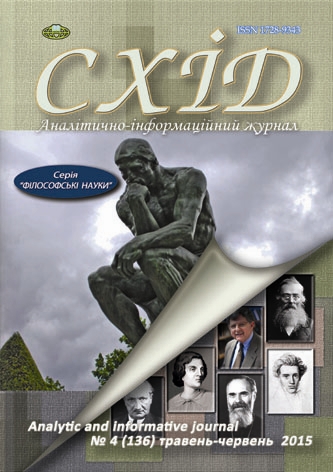Criticism of the Russian World concept in Ukraine
DOI:
https://doi.org/10.21847/1728-9343.2015.4(136).48403Keywords:
"Russian World", Orthodoxy, Russia, Ukraine, ideology, politics, Russian Orthodox Church, Ukrainian Orthodox Church of Moscow Patriarchate, Patriarch KyryloAbstract
The paper looks into the phenomenon of criticism of the Russian World concept in contemporary Ukrainian religious, political and social discourses. It is shown that the propagandistic ideological narrative model, developed according to numerous historical analogs, is becoming a subject of critical analysis by specialists in many scientific areas. Experts' views coincide in many respects but there are also different stances on some disputable issues. The historical aspiration of Russia for domination and substantiation of its unique nature is considered the root of the concept. This explains the use of such narrative constructs as "Moscow is the third Rome", "specific civilization" etc. Based on evidence of competent authorities, the author proves that the concept was most likely developed by a group of leading Russian ideologists in the late 20th century. It acquired the modern conservative and nationalist form only after it had become an object of interest of Russian clerical circles and started spreading through church resources. The symbolic figure in this respect is the current Moscow Patriarch Kyrylo (Gundiaiev) who has been an active promoter of the Russian World concept from the early 21st century. After he had been voted into the Patriarch office, Kyrylo turned the Russian World into the leading church and political narrative. The wide use of the concept for political purposes was consistently criticized for undisguised militarism, aggressive and nationalistic ideas underpinning the Russian World. According to numerous experts, these ideas have no common root with Christianity, sometimes being in open contradiction with the latter. Critical studies also indicate that the basis of the Russian World is the belief that the Russian culture and language are culturally superior to historical achievements of numerous other peoples, including the Ukrainians.
As historical experience shows, the use of such ideological concepts as the Russian World results in consolidation of society around one national idea and expansion of aggressive state policy to neighboring countries.Downloads
References
Portnov Andriy (2009), Between the "Central Europe" and "Russian peace": in the space of modern Ukraine international intellectual debate, NISD, Kyiv, 160 p. (ukr).
Potapenko Ya. (2013), Scientific notes of Ukrainian history, Pereyaslav-Khmelnitsky, 291 p. (ukr).
Polegkyi Oleksii (2011), Changes in Russian foreign policy discourse and concept of "Russian World", Pecob's Papers Series (Portal on Central Eastern and Balkan Europe), № 16 (october), 21 p. (engl).
Chernomorets Yu. P. (2009), Russian Patriarch Kirill world (with the pain for the fate of the Russian Orthodox Church and personally the Patriarch), available at: http://arhiv.orthodoxy.org.ua/ru/2009/11/10/27713.html (rus).
Levchenko T. (2009), RYSU, available at: http://www.portal-credo.ru/site/?act=monitor&id=14442 (rus).
Hovorun Kyryll (2014), Interpreting the "Russian world", available at: http://www.russ.ru/Mirovaya-povestka/Interpretiruya-russkij-mir (rus).
Ihumen Arseniy (Bochkar) (2011), What is the "Russkiy Mir"? The origins, current status, lessons, Relihiіa v Ukraini, available at: http://www.religion.in.ua/main/bogoslovya/7780-shho-yavlyaye-soboyu-ruskij-mir-vitoki-suchasnij-stan-uroki.html (ukr).
Yablonskyy V. M., Zdioruk S. I, Tokman V. V. and other (2014), Ukraine and the project "Russkiy Mir". Analytical report, Natsionalnyy instytut stratehichnykh doslidzhen, Kyiv, 95 p. (ukr).
East conflict in the context of global transformations (2015), Skhid, Special issue, 2 (february), available at://skhid.com.ua/issue/view/2342 (ukr).
Osmachko S. H. (2014), The modern political doctrine of the Russian Orthodox Church, Yaroslavl Pedagogical Journal, 83 p. (rus).
Posrednikov D. (2013), Political Orthodoxy in Ukraine, Hileya: naukovyy visnykб № 77, p. 283-286, available at: http://nbuv.gov.ua/j-pdf/gileya_2013_77_89.pdf (ukr).
Moroz Viktor (2009), The preacher of the past, Korrespondent, available at: http://korrespondent.net/Default.aspx?page_id=2 &lang=ru&roi=5&id=926939 &tu=propovednik-iz-proshlogo (rus).
The patriarch: the idea of "Russian measure" based on the concept of the CPSU Central Committee and has nothing to do with the Church (2013), Tyzhden.ua, available at: http://tyzhden.ua/News/72807 (ukr).
Message of Patriarch of Kyiv and All Rus-Ukraine Filaret on Russian annexation of Crimea (2014), available at: http://www.cerkva.info/uk/news/patriarkh/4574-patr-zvernennia-anshlius-krym.html (ukr).
Downloads
Published
How to Cite
Issue
Section
License
Copyright (c) 2015 Svitlana Shkil

This work is licensed under a Creative Commons Attribution-NonCommercial-NoDerivatives 4.0 International License.
1. Authors bear responsibility for the accuracy of facts, quotations, numbers and names used.
2. Manuscripts are not sent back.
3. The publisher does not always agree with the authors' opinion.
4. The authors reserve the right to authorship of the work and pass the first publication right of this work to the journal under the terms of a Creative Commons Attribution-NonCommercial-NoDerivatives 4.0 International License. This license allows others to distribute (copy) the published work for non-commercial purposes, provided there is mandatory attribution to its authors and a link to the first publication in our journal.
5. The authors have the right to conclude separate supplement agreements that relate to non-exclusive work distribution in the form in which it has been published by the journal (for example, to upload the work to the online storage of the journal or publish it as part of a monograph), provided that the reference to the first publication of the work in this journal is included.

